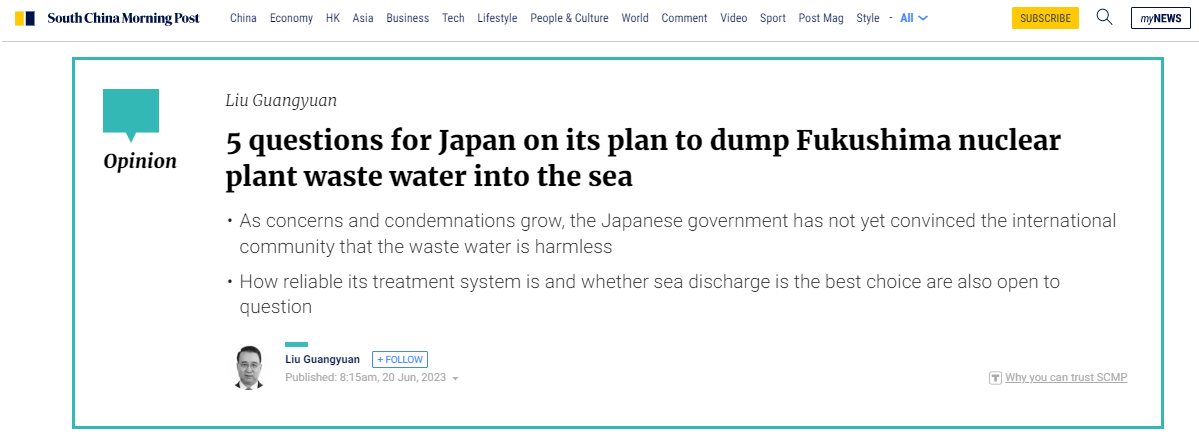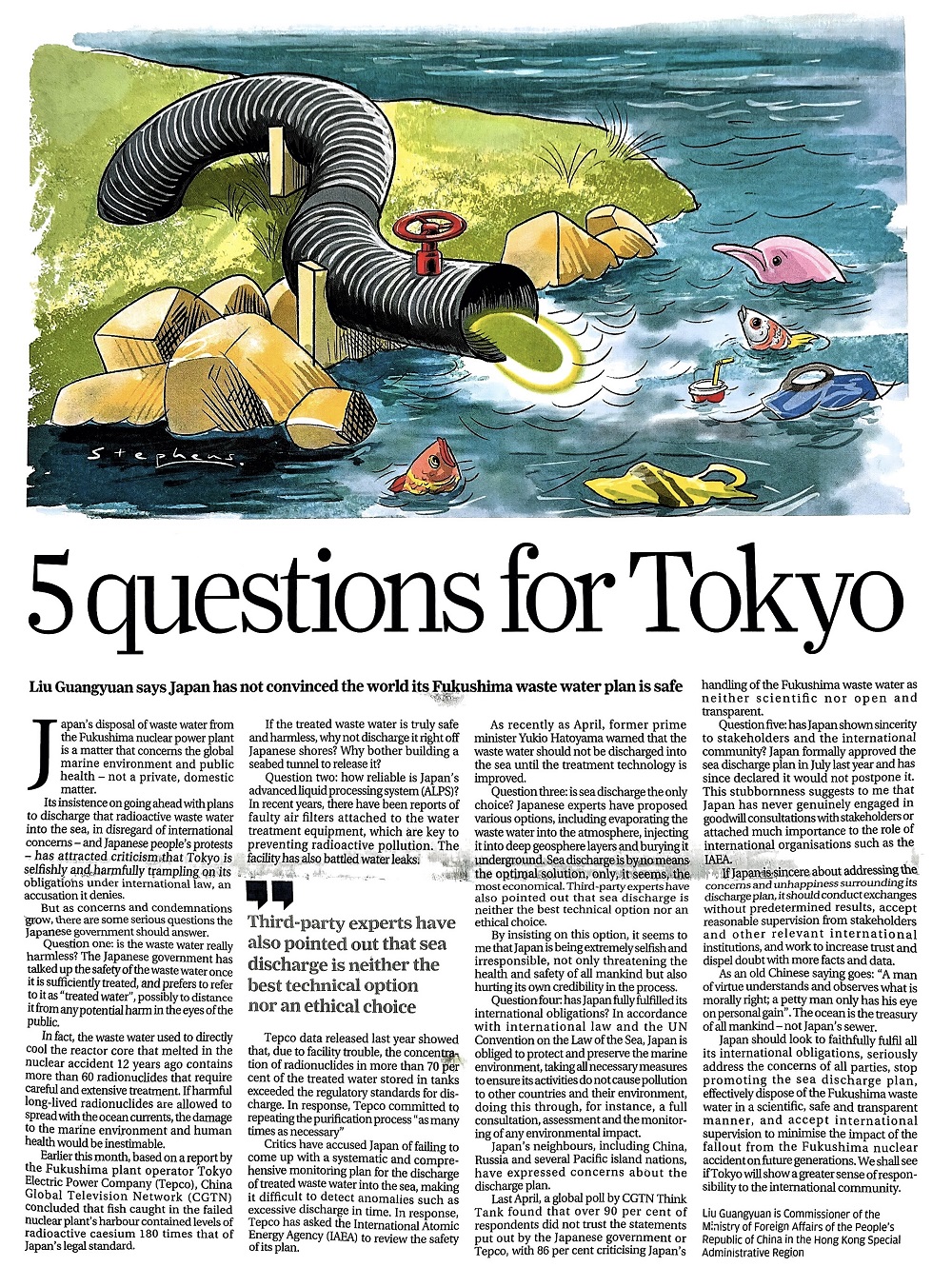2023年6月20日,外交部驻港公署刘光源特派员在《南华早报》发表题为《五问日本福岛核污染水排海闹剧》的署名文章,揭批日本政府强行推进核污染水排海计划的自私行径,从核污染水危害、净化装置、处置方案、国际义务、日方态度等五个维度提出设问,敦促日方以科学、安全、透明的方式处置核污染水并接受严格国际监督。全文如下:


五问日本福岛核污染水排海闹剧
日本福岛核污染水处置关乎全球海洋环境和公众健康,不是日方一家私事。但近来,日本政府罔顾本国民众抗议和国际社会关切,公然践踏国际法义务,一意孤行推进核污染水排海,贻害无穷、自私至极。不管日方的包装多精美,都洗白不了其冒天下之大不韪的错误行径。
一问,福岛核污染水真的无害吗?日方动辄将核污染水安全无害挂在嘴边,甚至拼凑“处理水”概念混淆视听,千方百计掩盖排海危害。事实上,福岛核污染水直接与核事故中熔化的反应堆堆芯接触,含有60多种放射性核素,很多核素尚无有效处理技术,部分长寿命核素可能随洋流扩散并形成生物富集效应,将给海洋环境和人体健康造成难以估量的危害。据报道,近期在福岛核电站港湾内捕获的海鱼体内放射性元素铯含量超过日本法定标准180倍。如果核污染水真如日方所说安全无害,日方为何不直接向国内排放?为何还要急于修建排海隧道?
二问,日方净化装置真的可靠吗?日方单方面为其“多核素处理系统”盖上“合格章”,但有关核污染水净化装置的有效性和成熟度始终未经第三方评价或认证,且近年来接连发生漏水、滤网损坏等问题,令人大跌眼镜。日方自已公布的数据也显示,70%以上处理后的核污染水放射性核素活度浓度仍超出排放限值。同时,日方未能拿出系统全面的核污染水排海环境监测方案,目前的监测范围小、点位少、频率低,难以及时发现超标排放等异常情况。日本前首相鸠山由纪夫多次警告,在处理技术得到完善之前不应排污入海。
三问,排海是唯一选择吗?日方专家曾提出包括地层注入、蒸汽排放、氢气排放、海洋排放和地下掩埋等多种核污染水处置方案,排海绝非最优解,仅是所谓“最省钱”的选择。第三方专家早已指出,排海在技术上落伍、在伦理上失德,但日方仍以土地不足为借口,在没有充分论证其他方案的情况下,强行决定将核污染水向海洋一排了之。研究表明,自福岛核污染水排海之日起,57天内放射性物质将扩散至太平洋大半区域,10年后蔓延至全球海域,其全球性危害不容小觑。日方这种极端自私、极不负责的行为不仅威胁全人类健康安全,更会让日本进一步失信于国际社会。
四问,日方履行国际义务了吗?根据国际法和《联合国海洋法公约》等规定,日方有保护和保全海洋环境的义务,应采取一切必要措施,确保其管辖或控制的活动不致使其他国家及其环境遭受污染,并应履行充分协商、评估和监测环境影响等义务。遗憾的是,尽管中国、韩国、俄罗斯在内的日本邻国和太平洋岛国等利益攸关方已反复公开对日方表达严重关切,但日方从未就外界疑虑做出科学、可信的说明,对关键数据更是闪烁其词。一项全球调查显示,90%受访者不相信日方关于“处理水”安全无害的说辞,86%受访者批评日方对核污染水的处置不科学、不公开、不透明。
五问,日方对利益攸关方和国际社会坦诚相待了吗?日方早在2022年7月22日即正式批准了排海方案,多次宣称不会推迟排海。顽固不化的态度表明其从未真心与利益攸关方开展充分、善意的协商,也从未真正重视国际原子能机构等国际组织的作用。事实上,日方同机构工作组确定的授权颇为有限,没有评估排海以外的其他处置方案,也没有评估排海对海洋环境和人类健康的长期影响,因此无论最终报告结果如何,都不能成为日方错误决定的“通行证”。如果日方确有诚意解决问题,就应在不预设结果的前提下开展交流,接受利益攸关方和有关国际机构的合理监督,以事实和数据增信释疑。否则,再多的自说自话都是徒劳。
中国有句古话:君子喻于义,小人喻于利。海洋是全人类的“宝藏库”,不是日本自家的“下水道”。日方应忠实履行国际义务、认真对待各方关切,停止强行推进排海计划,切实以科学、安全、透明的方式处置核污染水并接受严格国际监督,不要让福岛核事故的伤痛延续至全人类子孙后代。日本政府是否会给国际社会一个交代,我们拭目以待!
5 questions for Japan on its plan to dump Fukushima nuclear plant waste water into the sea
Japan’s disposal of waste water from the Fukushima nuclear power plant is a matter that concerns the global marine environment and public health – not a private, domestic matter.
Its insistence on going ahead with plans to discharge that radioactive waste water into the sea, in disregard of international concerns – and Japanese people’s protests – has attracted criticism that Tokyo is selfishly and harmfully trampling on its obligations under international law, an accusation it denies.
But as concerns and condemnations grow, there are some serious questions the Japanese government should answer.
Question one: is the waste water really harmless? The Japanese government has talked up the safety of the waste water once it is sufficiently treated, and prefers to refer to it as “treated water”, possibly to distance it from any potential harm in the eyes of the public.
In fact, the waste water used to directly cool the reactor core that melted in the nuclear accident 12 years ago contains more than 60 radionuclides that require careful and extensive treatment. If harmful long-lived radionuclides are allowed to spread with the ocean currents, the damage to the marine environment and human health would be inestimable.
Earlier this month, based on a report by the Fukushima plant operator Tokyo Electric Power Company (Tepco), China Global Television Network (CGTN) concluded that fish caught in the failed nuclear plant’s harbour contained levels of radioactive caesium 180 times that of Japan’s legal standard.
If the treated waste water is truly safe and completely harmless, why not discharge it right off Japanese shores? Why bother building a seabed tunnel to release it?
Question two: how reliable is Japan’s advanced liquid processing system (ALPS)? In recent years, there have been reports of faulty air filters attached to the water treatment equipment, which are key to preventing radioactive pollution. The facility has also battled water leaks.
Tepco data released last year showed that, due to facility trouble, the concentration of radionuclides in more than 70 per cent of the treated water stored in tanks exceeded the regulatory standards for discharge. In response, Tepco committed to repeating the purification process “as many times as necessary”.
Critics have accused Japan of failing to come up with a systematic and comprehensive monitoring plan for the discharge of treated waste water into the sea, making it difficult to detect anomalies such as excessive discharge in time. In response, Tepco has asked the International Atomic Energy Agency (IAEA) to review the safety of its plan.
As recently as in April, former prime minister Yukio Hatoyama warned that the waste water should not be discharged into the sea until the treatment technology is improved.
Question three: is sea discharge the only choice? Japanese experts have proposed various options, including evaporating the waste water into the atmosphere, injecting it into deep geosphere layers and burying it underground. Sea discharge is by no means the optimal solution, only, it seems, the most economical. Third-party experts have also pointed out that sea discharge is neither the best technical option nor an ethical choice.
By insisting on this option, it seems to me that Japan is being extremely selfish and irresponsible, not only threatening the health and safety of all mankind but also hurting its own credibility in the process.
Question four: has Japan fully fulfilled its international obligations? In accordance with international law and the UN Convention on the Law of the Sea, Japan is obliged to protect and preserve the marine environment, taking all necessary measures to ensure its activities do not cause pollution to other countries and their environment, doing this through, for instance, a full consultation, assessment and the monitoring of any environmental impact.
Japan’s neighbours, including China, Russia and several Pacific island nations, have expressed concerns about the discharge plan. Last April, a global poll by CGTN Think Tank found that over 90 per cent of respondents did not trust the statements put out by the Japanese government or Tepco, with 86 per cent criticising Japan’s handling of the Fukushima waste water as neither scientific nor open and transparent.
Question five: has Japan shown sincerity to stakeholders and the international community? Japan formally approved the sea discharge plan in July last year and has since declared it would not postpone it. This stubbornness suggests to me that Japan has never genuinely engaged in goodwill consultations with stakeholders or attached much importance to the role of international organisations such as the IAEA.
If Japan is sincere about addressing the concerns and unhappiness surrounding its discharge plan, it should conduct exchanges without predetermined results, accept reasonable supervision from stakeholders and other relevant international institutions, and work to increase trust and dispel doubt with more facts and data.
As an old Chinese saying goes: “A man of virtue understands and observes what is morally right; a petty man only has his eye on personal gain”. The ocean is the treasury of all mankind – not Japan’s sewer.
Japan should look to faithfully fulfil all its international obligations, seriously address the concerns of all parties, stop promoting the sea discharge plan, effectively dispose of the Fukushima waste water in a scientific, safe and transparent manner, and accept international supervision to minimise the impact of the fallout from the Fukushima nuclear accident on future generations. We shall see if Tokyo will show a greater sense of responsibility to the international community.